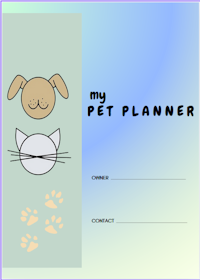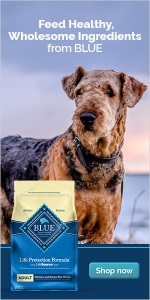Curly-coated Retriever
Extremely Loyal And Fun Loving!
The Curly-coated Retriever is an old breed that originated in England and has records dating back to around 1803.
Small Newfoundlands, the Irish Water Spaniel, and various other retriever type dogs are thought to be contributors to the development of the breed which occurred between the 17th-18th centuries according to reputable sources.
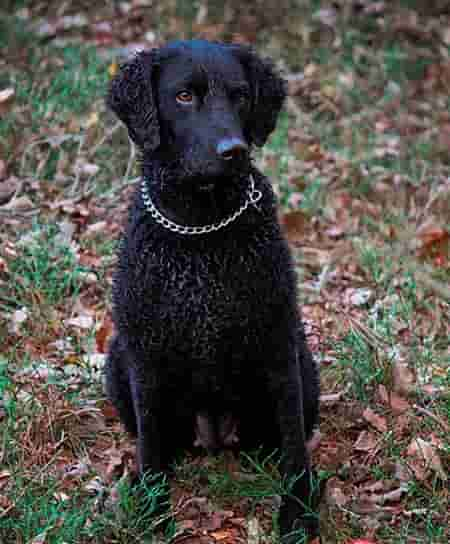 Courtesy: M.Agar
Courtesy: M.AgarIt is also quite likely that the Poodle was involved at some point in
the breeding selection - certainly their intelligence and type of coat
seem to bear this out.
The Curly-Coated Retriever is a calm and graceful dog with an erect and
confident air about him.
His most distinctive feature is the profuse curly coat that covers his
entire body, save the face and muzzle, which have short smooth hair.
This handsome tall dog is an outstanding retriever with great endurance
when it comes to working long days in adverse conditions.
His abilities extend to finding fallen game that others have left behind.
Living With A Curly-Coated Retriever
Among the outstanding qualities of the Curly-coated Retriever is his extreme loyalty and protective instincts toward his
owner.
He is a fun loving dog and will put out the welcome mat for friends he has come to know and enjoy. But strangers fall
into another camp - in this situation, he will be politely cool and calm while checking out a newcomer.
Do socialize this breed early with a variety of experiences, activities, people, pets and places to balance out the Curly's personality as he matures into adulthood. Bear in mind that Curlies are considered late-maturers, often exhibiting puppy-like behavior for quite a few years.
Take this into account when you are training them too. Try to provide creative sessions that feed into their intelligent minds, yet don't overlook the fact that young pups have short attention spans!
Physical Stats of the Curly
Height: 25-27 inches
Weight: 70-80 lbs
Color variations: Solid black or liver
The CCR is a single coated breed - meaning there is no undercoat.
Surprisingly, the waterproof tightly curled coat requires almost no grooming. Taking a brush to it will make the coat
become frizzy looking and is not recommended by most professional groomers.
However, during shedding - about twice a year - combing out the loose hair with a rake or a wide-thooth comb is recommended. This would also be a good time for bathing.
One other interesting feature about the coat is that it stops growing at a certain point, so only the odd stray wisps of hair need trimming.
Because the coat grooming is pretty easy to handle, there is plenty of time left for regular inspection of the ears, nails and teeth and their maintenance!
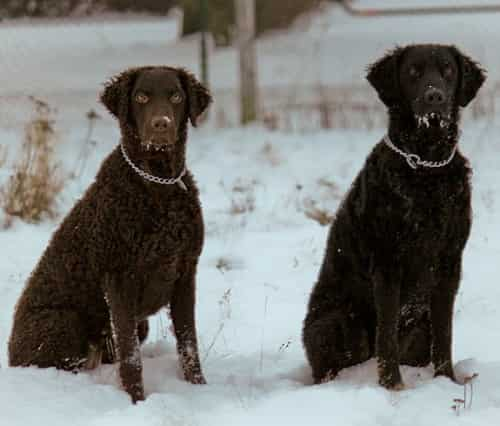 By M.Agar
By M.AgarHealth Notes
Curly-Coated Retrievers that are given good health care and nutritious
food, can generally be expected to live for 10 to 14 years, though some
have lived much longer.
Health issues that may affect this breed include:
- Hip dysplasia
- GSD (glycogen storage disease)
- Bloat
- Canine epilepsy
- Subaortic stenosis and patent ductus arteriosus
- Eye disorders - cataracts, progressive retinal atrophy, retinal dysplasia
- Canine follicular dysplasia
Screening tests are available for:
- Hip and Elbow Dysplasia
- Cardiac evaluation
- Eye evaluation
- Glycogen Storage Disease
Breeders should have had these screenings performed on the sire and dam prior to breeding and should be more than willing to present the certified results to those seeking a healthy puppy.
More details on health are available at the breed club here.
How Active Are Curly-coated Retrievers?
The Curly-coated Retriever is used to working long days retrieving game in often adverse conditions. If he is not being used in this respect, other forms of vigorous exercise will be needed to prevent him from seeking his own outlets in ways that may be negative.
Being very much a loving family dog, long walks or jogs, games of fetch with the kids and any jobs where
he can be at your side, will keep him happy. Access to water activities would also be a natural form of exercise, but if that
is not an option, think about agility.
While outdoor exercise is the best kind, there are often days when
outdoor exercise is not possible due to time or weather constraints. On
these occasions, high energy dogs such as the CCR can get a workout on a
treadmill designed for pets.
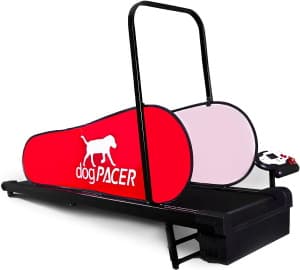
Ideal Living Conditions
Curly-coated Retrievers need room to run, so they are best suited to a home with a substantial yard. Make sure your property
has secure boundaries as these dogs have a reputation for being great escape artists.
They are also good jumpers, but the
main thing to remember here is that a well-exercised (as in tired) dog will not usually seek other distractions.
Suitable Companion For Children?
Curlies have kind natures and are very playful. They have a good reputation with children but because of their high energy level and size may be too overwhelming for very young ones.
Even older children should be trained to approach and how to be respectful with this large, somewhat indepentdent dog breed.
Whatever the family profile, we caution that interactions between children and dogs should always be under adult supervision.
Senior or Less Active Families?
Although the Curly-Coated Retriever makes a wonderfully loyal companion, inactive seniors or more sedentary households should carefully consider the exercise needs of this breed.
Share Your Knowledge and Pictures
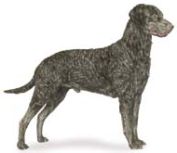
Do you have a Curly-coated Retriever?
If you are enjoying one of these rare and unique retrievers we know you must be devoted to the breed. Plus you have the "insider" knowledge of what Curlies are like as family companions!
We would love for you to share your pictures as well as the pros and cons about life with a Curly. This would be so helpful to those wondering if this breed is right for them.
You can upload photos and tell your dog's story here.
For inspiration, read some of the stories already submitted by other dog lovers.
https://commons.wikimedia.org/wiki/File:Curly_Coated_Retrievers.jpg by Mattias Agar
https://creativecommons.org/licenses/by-sa/2.0

